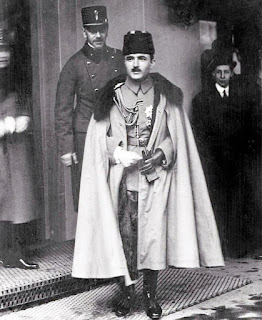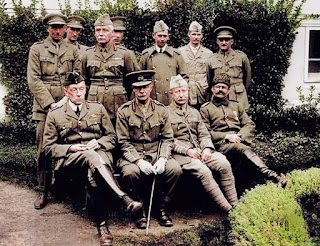This is a historical novel that takes place in Turkey,
during the Occupation of Constantinople.
(1918-1923)
The novel opens in February of 1919 in Istanbul.
Chapter One
Binoculars of General
von Kress
The main character Jamil is back from the Great War to a
defeated and occupied Istanbul. One of the old names of Istanbul is Der Saadet
meaning the “door of happiness”, however in February of 1919, there was despair.
In the aftermath of the Great War, the Ottoman
Empire was partitioned by the allies and now British and French troops were in
the city. The occupation started in November of 1918.
Jamil was at the Sinai and Palestinian front, fighting
against the British forces. He took part in Canal Operations and Gazze wars.
Their German Commander was a man named Von Kress. A man from Nurenberg, who was
also teaching at the War Academy in Istanbul before the war.
During the Abdulhamit era, a number of German specialists
came to the country to help to modernize the army, as well as to take part in
civilian projects. During that time the construction of the Berlin Bagdad railway
also started. The German aim was to improve commerce with the Ottoman empire,
selling industrial goods and buying raw material and food products.
The railway line was supposed to continue to Basra, a port
at the Persian Gulf. This was close to British interests. Even though that area
was under Ottoman control, the British presence could be seen more and more,
especially in Kuwait.
Egypt was also under British control and the Suez Canal area
was vitally important for British naval trade. This area had to be protected by
the British and French who had commercial interests regarding the Suez Canal.
During WW1 Germany wanted to attack the Suez Canal and the
Turkish troops were under German command.
When Abdulhamit was dethroned in the Young Turk revolution
in 1908 The Committee of Union and Congress took power and its three rulers
Enver, Jamal, and Talaat continue to have good relations with Germany.
The country was poor and German money was welcomed. Enver
Pasha, even though he was young, rose quickly in the military ranks, later
married a royal princess and was able to have good relations with the palace as
well. He was a charismatic man who spoke many languages. The Germans start
calling Turkey
Enverland.
When the war broke out in Europe, he made an agreement with
the Germans without consulting with the palace or the CUP, not even with Talat
and Jamal.
Jamal Pasha didn’t like the Germans that much and he would
like an alliance with the French better.
Similarly, some other generals and politicians didn’t want
to enter the war and didn’t want to be on the German side. However, when two
German ships came to Dardanelle, they were allowed in Turkish waters and given
passage to the Black Sea by going through Bosphorus. England accepted this as
Turkey’s entry into the war. The Turkish side said they bought the ships and
changed the names of the ships. However, that didn’t fool anyone since the
ships started to bombard Russian ports in the Black Sea.
Enver Pasha ordered mobilization. In Turkey CUP especially its
leaders were accused of plunging the country into the war. In the book, Dr.
Munir asks Halil Pasha, “Was there any other way? Why we entered the war? Couldn't
we have avoided it?” It was a difficult question for Halil Pasha. Surely in
real life, the leaders of the CUP were asked the same question and Jamal Pasha
answered by saying that we weren’t able to pay the salaries of the civil
servants and the soldiers. Surely the economic
situation was a factor with the German alliance.
Even if they have entered the war with a few months' delay,
that would have been good because the young man left the fields at the
beginning of the harvest season and this meant food shortages by the year’s end
in Istanbul.
During the four years of the Great War Turkish forces had to
fight in 13 fronts. They weren’t well equipped. In 1915 many soldiers died in
Eastern Turkey fighting against Russians, most of the soldiers died because of
the cold.
Many things happened in 1915. In the west, the Entente
Powers, Britain France, and Russia started the Gallipoli campaign (Battle of Çanakkale) their aim was to capture Istanbul however Turkish side defended
their country well and Mustafa Kemal Ataturk became a well-known general with
this victory. There were also many soldiers from Australia and New Zealand
whose grandchildren still visit Canakkale today at Anzac day and participates
in Dawn Prayers.
Another significant event of that year was the Deportation
of the Armenian Population.
After the Balkan wars of 1912-13, the Balkan nations became
independent. Ottoman Army suffered a humiliating defeat at that time. Probably
because of that the Armenian population in Turkey also started to fight against
the Empire. Actually, Armenian events had started during the Abdulhamit’s time.
However, Abdulhamit was able to suppress those uprisings. They have even tried
to take over the Ottoman bank, organize terrorist activities and kill the
Sultan. Abdulhamit was not popular in the country. So the Young Turk Revolution
was supported by large numbers of the people, including the Armenians.
The Reluctant Warrior opens with the suicide of Governor of
Diyarbakir Dr. Rashid. When Dr. Rashid went to Diyarbakir as a Governor, he
learned that the Armenian houses were full of weapons and bombs. They had
already killed the Muslim population in Van and Bitlis provinces and now they
were preparing a massacre in Diyarbakir. Russia was giving weapons to the
Armenians and encouraging them to fight the Ottoman government.
In the eastern provinces, Turkish soldiers were under crossfire
between the Russian and Armenian troops and the same thing was happening in the
south with the French army. Some Armenians were wearing Russian uniforms and
some were wearing French uniforms. CUP decided to deport the Armenian
population to Syria which was an Ottoman province as well.
Some governors refused this order saying that they can’t let
civilians leave their houses and walk to Syria. Some Governors like Dr. Rashid
obeyed the orders. So a lot of Armenians died in the road there were not enough
vehicles for transportation, some had to walk. Some died because of cold or
hunger or various diseases. Some were murdered. Some children and young women
stayed behind. Their parents thought they would be safer with their Muslim
neighbors. Those children were brought up as Muslim children. Some young women
got married to Turkish men.
Jamal Pasha was the
Governor of Syria. He tried to help the Armenians who made it there. There were
orphanages and help from various organizations. Some refugees went to France
afterward. Some stayed in the Middle East. Some came to North America.
Armenian Church in Akdamar Island Van Province
During this time American Ambassador to the Ottoman Empire
Henry Morgenthau wrote reports to the New York Times and that’s how the western
population learned about the Armenian massacres and the difficulties that they
were having.
The term genocide was not used at the time usually people
talked about massacres both about the Turkish population and Armenians.
Today some counties voted for recognizing those events as
genocide in their parliaments. Turkey doesn’t accept this.
While he was Governor of Diyarbakir Dr. Rashid also took
Armenians possessions because of that reason he was called back to Istanbul by
Talat Pasha.
After the war, during the Occupation CUP members and the
people who were accused of Armenian massacres were put in jail by the British
forces.
Teskilati Mahsusa(TM) The Special Organisation of CUP,
helped those former members to flee out of jail.
Dr. Rashid was really one of the people who escaped and he
really committed suicide in Fulya fields of Besiktas while trying to go home to
see his family. Police were after him and in order not to get arrested again,
he despaired and committed suicide.
The novel opens with this scene, Jamil and Neriman
witnessing Dr. Rashid’s suicide, using the binoculars which were a gift from
General von Kress to Jamil for his efforts in sinking a British Ship during the
canal operations.
Besiktas area, Istanbul
Jamil is a fictional character but many events that are
mentioned in the book are real.
The first chapter of the book is where we meet the
characters. What have you thought about them?
How was the relationship with Jamil and Neriman?
After seeing Dr. Rashid’s death Neriman was upset. She
thought about all the people who died in the war. She wondered how they felt in
the face of danger and their instinct to escape from the war. She also wondered
about how the soldiers were able to shot a person. She asked about artilleryman.
Neriman wondered how they fire the cannons and kill the people on the other
side without even seeing them.
What are the feelings of the soldiers during the wars?
Neriman also realized Dr. Rashid was the visitor Jamil was expecting
for lunch. A day before someone came to the house and talked to Jamil. Neriman
made the connection and understood that Jamil had accepted to help Dr. Resid
without even telling her.
He put himself and the family in danger without even asking
her if she would allow this man to stay at their house.
She was in shock when she realized that. After waiting for
Jamil to come home after all those years she was hoping for a happy life
together. She is deeply disappointed and scared.
Another subject to be discussed later in the book is how a
human being can make a decision to hurt people. Governor of Diyarbakir was a
medical doctor, a person like all the other doctors who swore to save the lives
of people. He was a good, well-mannered man. He was one of the founding members
of the CUP.
Dr. Munir wondered about that and asked this question to Halil
Pasha. He said Dr. Rashid did this to save the country. In real life, this question
was asked to Dr. Rashid himself and according to Wikipedia he answered as
follows:
Being a doctor could not
cause me to forget my nationality! Reshid is a doctor. But he was born as a
Turk...Either the Armenians were to eliminate the Turks, or the Turks were to
eliminate the Armenians. I did not hesitate when I was confronted with this dilemma.
My Turkishness prevailed over my profession. I figured, instead of wiping us
out, we will wipe them out...On the question of how I, as a doctor, could have
murdered, I can answer as follows: the Armenians had become hazardous microbes
in the body of this country. Well, isn’t it a doctor’s duty to kill microbes?
Needless to say, there are some differences between the
Armenian historians and the Turkish historian’s accounts of the events.
At the end of this chapter, Lieutenant Faruk comes to inform
Jamil that their mutual friend Maksood the Arab wanted to see Jamil. Even
though it was a cold and snowy day, Jamil went to see him. But first, he had
another person to see, Yahya Hodja who was a family friend. Yahya asked Jamil;
about his future plans encouraged him to open a business and settle down by
marrying Neriman.
This first chapter could be a short story by itself. Some
say for a good novel you have to have something happening right at the
beginning, good character development and conflict/tension should also be
present. It seems that the first chapter has it all.

























































































































